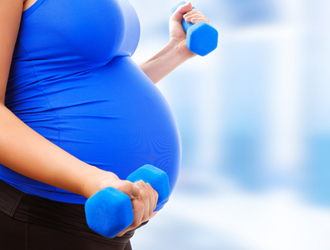Exercising during pregnancy is an essential part of a healthy pregnancy and an important element in a healthy weight gain process. Read on for some useful tips about exercises for pregnant women.
A healthy Pregnancy
You don’t smoke or drink and you eat a well-balanced diet, so you should just kick your feet up and rest for the rest of the pregnancy, right? Wrong! Experts point out that keeping fit is an essential part of a healthy pregnancy. So break out the workout gear and get your heart pumping.Benefits of keeping fit during pregnancy
Exercising about 30 minutes a day contributes greatly to a healthy pregnancy. It helps you manage weight gain, strengthen your muscles in preparation for labor, improve your heart rate, reduce stress, and generally feel better. Before getting started, check with your physician that the workouts chosen are appropriate and safe.
Pregnancy Exercising Tips
- Warming up and cooling down – Warm up your joints and muscles before engaging in pregnancy workouts to prevent painful muscle strain
- Eating – You will burn many calories during your pregnancy exercises, so make sure to eat more and monitor your weight gain and weight loss.
- Weight gain – Weight gain is a natural part of pregnancy. Keeping fit during pregnancy is not about weight loss, but rather about striving for a healthy pregnancy.
Safety during pregnancy workouts
Get into a workout routine slowly, drink lots of water, and don’t exercise to the point of exhaustion. Also, avoid the following:
- Lying flat on your back – Lying flat on your back during the first trimester puts a lot of pressure on the vena cava vein, which can decrease blood flow to your heart, uterus, and brain and lead to nausea or shortness of breath. Place a pillow under your hip to avoid lying flat.
- Overheating –When you are pregnant, your metabolic rate and blood flow are greater, leading to quicker overheating. Stop exercising if you find yourself sweating profusely or feeling very warm or nauseous. Drink lots of water and step in front of an air conditioner or into a cool shower.
- Staying too long in one spot – When you stay in one place for too long, your blood flow to the uterus can decrease and lead to dizziness, so keep moving or change positions.
- Getting up slowly – Don’t get up or change positions too abruptly, as you may become dizzy or lose your balance and fall down.
- Elevation – Exercising at a very high elevation without first being acclimated puts you and your baby at risk for altitude sickness.
- Exercises to avoid during pregnancy – Don’t engage in any kind of contact sport during pregnancy.
Stop exercising and contact your doctor if at any time you experience vaginal bleeding, fluid leakage, difficulty breathing, pain in your chest, extreme dizziness, decreased movement of the fetus, or swelling of your calves or ankles,
Pregnancy Workouts
Choosing pregnancy exercises that you enjoy is an optimal way to keeping fit. Here are some suggestions:
- Swimming – Due to the feeling weightlessness in the water, exercising in water enhances your range of movement without exerting pressure on your joints. To avoid risk of stomach impact, do not jump or dive into the water. Stay away from very hot pools to avoid overheating.
- Yoga – Yoga helps you relax, strengthen your muscles, enhance body circulation, and gain greater flexibility. As your due date inches closer, avoid yoga positions that entail a great deal of balance or having to lie flat on your back.
- Stretching – Stretching is a great way to warm up and cool down after pregnancy workouts. It helps you relax and avoid straining your muscles.




